This post may contain affiliate links. Please read our disclosure policy.
Chicken Donburi, also known as oyako donburi, is an easy-to-make Japanese chicken and egg rice bowl that’s both comforting and delicious. With tender chicken simmered in a savory broth and eggs cooked to perfection, this dish brings a wonderful blend of flavors and textures to your table with minimal effort.
In this recipe, we’ll show you simple steps to create the perfect Chicken Donburi at home. With our easy tips and techniques, you’ll quickly have a tasty, restaurant-quality meal ready in no time!
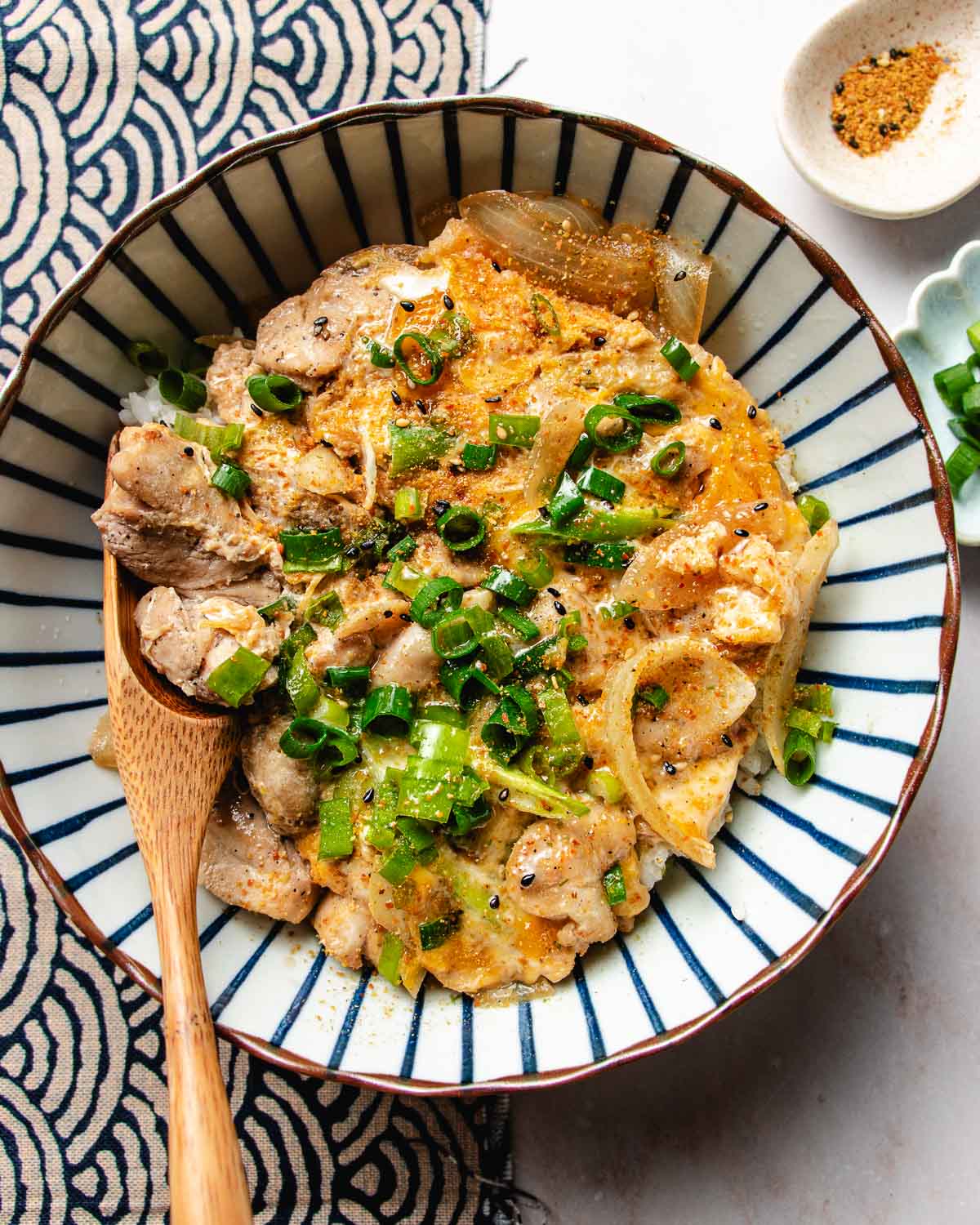
Table of Contents
What is chicken oyako donburi
Chicken Oyako Donburi, often simply called Oyakodon (親子丼), is a popular Japanese comfort food. This dish features tender chicken pieces simmered with sliced onions in a savory and slightly sweet broth.
The word “Oyakodon” is a combination of two Japanese words: “oyako” (親子) meaning “parent and child” and “don” (丼), which is short for “donburi,” referring to a bowl of rice with toppings.
The name “parent and child” comes from the use of chicken and eggs in the dish, symbolizing a parent (chicken) and its child (egg). This playful and meaningful name reflects the dish’s use of these two ingredients, which are simmered together to create a harmony of flavors.
Ingredients for chicken oyako donburi
Here’s everything you need to make Chicken Donburi. You can find these ingredients in most grocery stores, and we’ve also included some easy substitutes!
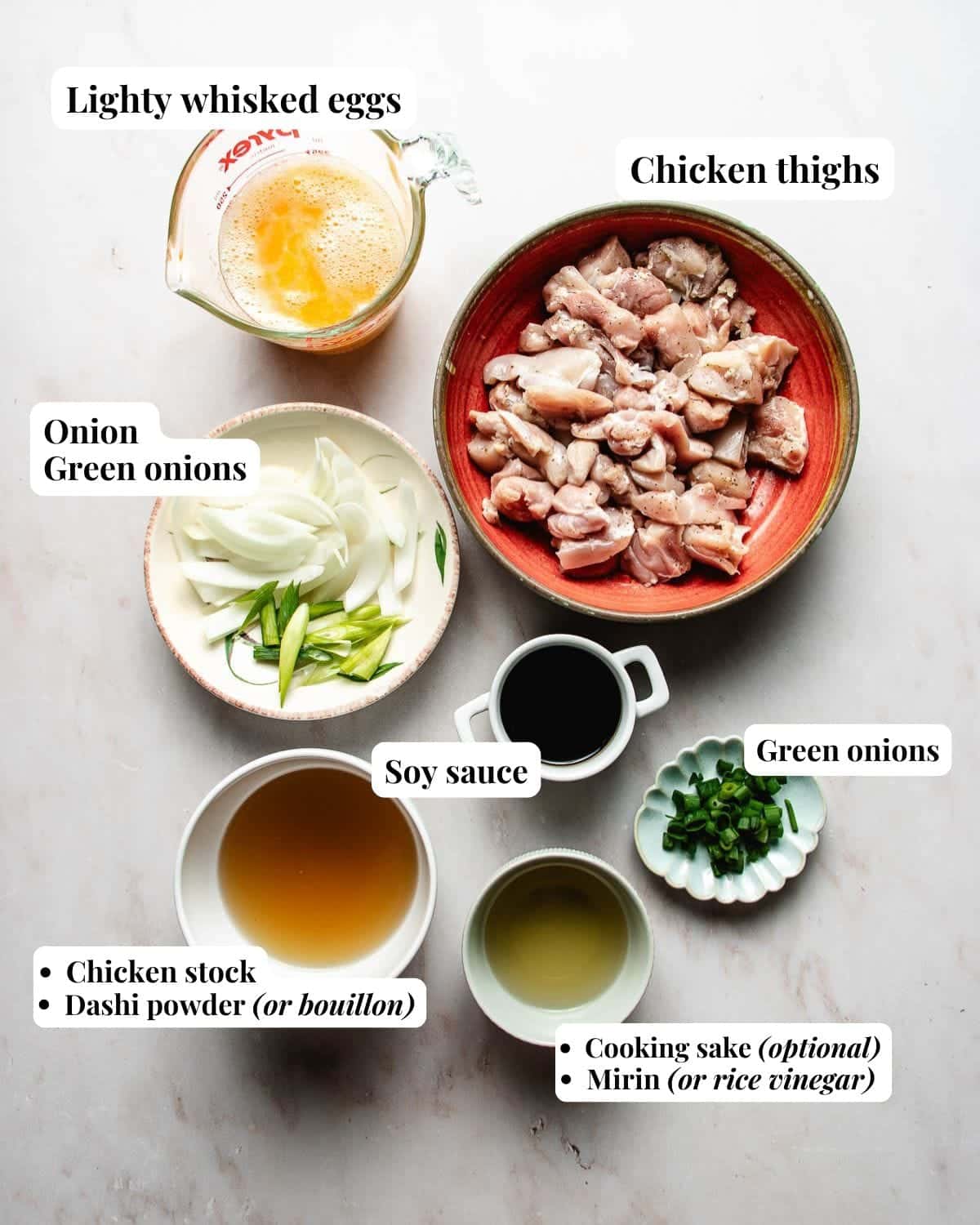
- Chicken thighs, boneless and skinless: Provides tender, juicy meat with a rich flavor perfect for simmering.
- Coarse sea salt
- Ground black pepper
- Sake: Tenderizes the chicken and adds a depth of umami flavor (optional).
- Substitute: Chinese cooking wine
- Avocado oil: Used for searing the chicken, it has a high smoke point and neutral flavor.
- Yellow onion: Adds sweetness and a subtle sharpness, creating a flavor base for the dish.
- Green onion (white and green parts): Provides a fresh, mild onion flavor and a pop of color.
- Large eggs: Creates a creamy, silky texture that binds the ingredients together and enriches the dish.
Donburi sauce
- Chicken broth: Forms the base of the donburi sauce, adding depth and richness.
- Instant dashi powder: Boosts umami, enhancing the savory taste of the sauce.
- Substitute: Mushroom bouillon powder, or chicken bouillon
- Light soy sauce: Adds saltiness and umami, giving the dish its signature savory flavor.
- Cooking sake: Adds complexity and enhances the flavors in the sauce.
- Substitute: Dry sherry, or Chinese shaoxing wine
- Mirin: Contributes a mild sweetness and a slight tang, balancing the flavors in the sauce.
- Substitute: Rice vinegar
What is instant dashi
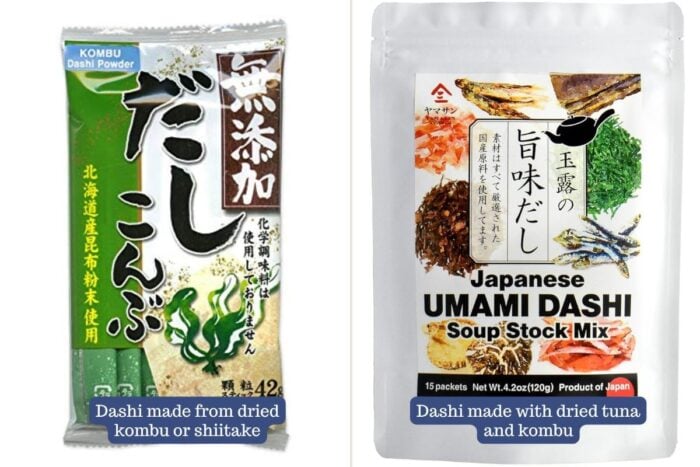
Instant dashi is a quick and convenient seasoning powder used in Japanese cooking to add a deep umami flavor. It’s made from ingredients like dried seaweed (kombu) and dried fish flakes (bonito – dried tuna), giving dishes a rich, savory taste without needing to make dashi from scratch.
How to make chicken egg rice bowl
With our simple steps and tips, you’ll create the most delicious Oyako don sauce with tender chicken and creamy eggs. Follow along, and you’ll have this comforting, flavor-packed Japanese rice bowl ready in no time!
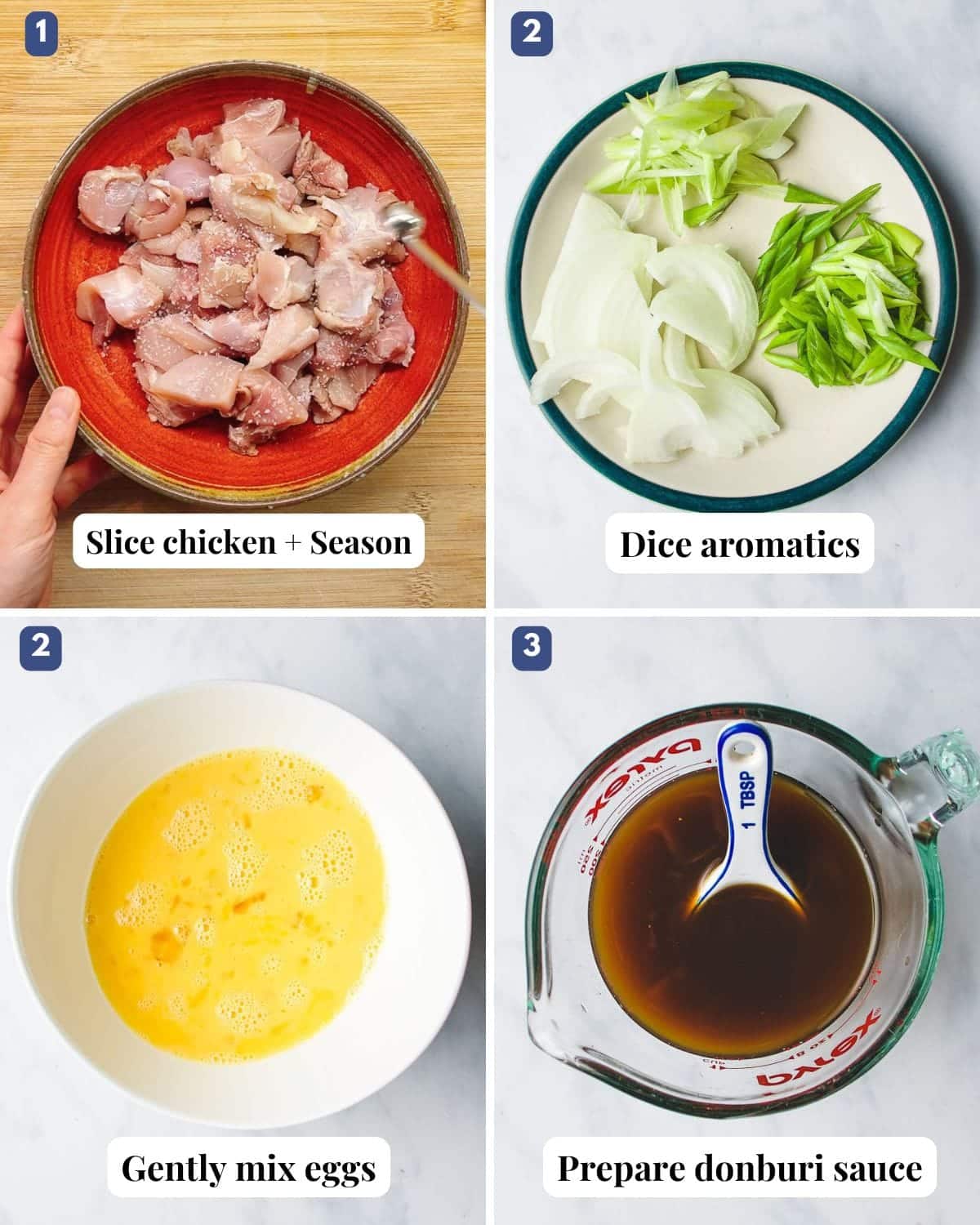
- Prepare the chicken: Trim excess fat and slice chicken into bite-sized pieces (about 3/4 inch). Season with salt, pepper, and sake (if using). Set aside.
- Prepare aromatics and eggs: Slice the yellow onion into thin strips (0.5 inch). Separate green onion into white and green parts; slice whites diagonally for cooking, chop greens for garnish. Separate egg yolks and whites, lightly whisk, then combine to keep marbled.
- Make the broth: Mix chicken stock with dashi or bouillon powder in a measuring cup. Stir well to combine.
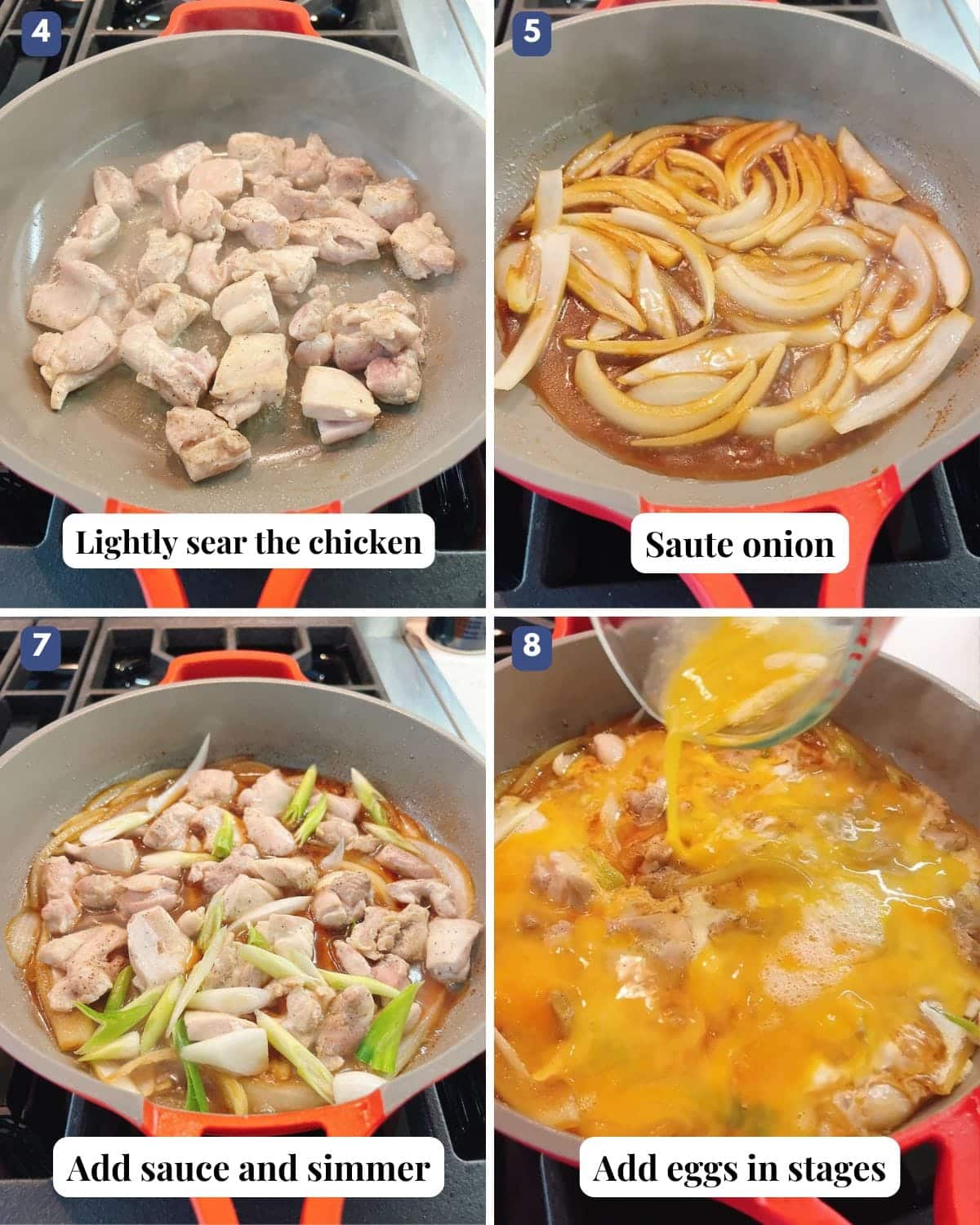
- Sear the chicken: Heat avocado oil in a 9-10 inch sauté pan over medium heat. Add chicken in a single layer, searing each side for 2 minutes. Transfer chicken out, leaving juices in the pan.
- Sauté the onion: Use the pan’s rendered fat to sauté the onion over medium heat for about 2 minutes until it begins to sweat but stays crisp.
- Add seasonings: Pour in the soy sauce, let it sizzle for 2 minutes, then add the sake and mirin. Shift the pan periodically and reduce the sauce slightly over 4 minutes.
- Add stock and chicken: Pour in the stock mixture, add the white scallion parts, and return the chicken to the pan. Simmer uncovered over medium heat for about 6 minutes, allowing the flavors to concentrate without over-reducing.
- Add eggs in stages: Slowly pour in ⅓ of the eggs, cover the pan for 1-2 minutes to set. Uncover, add the second ⅓, cover again for 1-2 minutes. Repeat with the final portion, leaving some eggs soft and runny.
- Serve: Spoon the chicken, eggs, and sauce over bowls of steamed white rice. Garnish with green scallion parts and serve warm.
How to make it family style (larger serving)
Japanese chicken egg rice bowls are usually made in single servings using a small, shallow oyakodon pan, which makes it easy to slide the food onto a bowl of rice.
For a larger, family-style portion, use a medium-sized sauté pan, about 9-10 inches, with a lid. Choose a pan with some depth to hold the broth but wide enough to allow moisture to evaporate efficiently.
What to serve it with
This comforting dish pairs wonderfully with simple sides and refreshing drinks. Here are a few ideas to complete your meal.
- Rice: Traditionally, oyako donburi is always served with rice. Try it with steamed white rice (short-grain rice) or give my air fryer rice a try.
- Pickles/Vegetables: Add a refreshing crunch by serving Asian pickled cucumbers, Japanese cucumber salad, or Japanese spinach salad (gomaae).
- Drinks: A sake grapefruit cocktail is the perfect way to wash down this savory and delicious meal.
ChihYu’s expert tips
- ¾ Inch (2 cm) Chicken Pieces: Slice the chicken into bite-sized pieces, about ¾ inch (2 cm), to ensure even cooking and tender, juicy bites.
- Duo Egg Color: For a beautiful marbled look, separate the yolks and whites. Gently whisk the whites to break them up, then add the yolks and give them a light mix with 3-4 swirls.
- Add Eggs in Stages: Pour the eggs in three stages to achieve a soft, creamy consistency. Covering the pan briefly after each addition helps the eggs set without overcooking.
- Don’t Over-Reduce the Sauce: Keep the sauce flavorful and slightly thickened, but not too reduced. There should be enough sauce left to soak into the rice, making each bite full of rich flavor.
More Japanese chicken recipes
If you enjoyed making Egg and Chicken Donburi, here are a few more delicious Japanese-inspired dishes to try. Each one is packed with flavor and sure to be a hit at your table!
- Air Fryer Teriyaki Chicken: Enjoy tender chicken with a crispy coating, coated in a sweet and savory teriyaki glaze.
- Chicken Katsu Ramen Bowl: A comforting bowl of ramen topped with crispy fried chicken katsu, rich broth, and noodles.
- Simmered Daikon with Chicken: A light and flavorful dish featuring tender chicken and daikon radish, simmered in a savory broth.
- Tsukune (Japanese Chicken Meatballs): Juicy chicken meatballs glazed in a sweet soy sauce, perfect as an appetizer or main dish.
Chicken donburi recipe
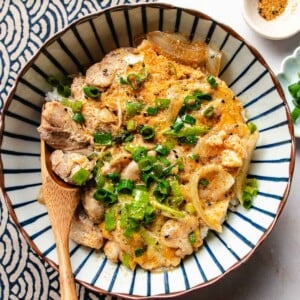
Video
Ingredients
For the chicken:
- 1 lb chicken thighs boneless and skinless
- ¼ tsp coarse sea salt
- Sprinkle ground black pepper
- 2 tsp sake or Chinese cooking wine, optional
- 0.5 tbsp avocado oil
Aromatics & Eggs:
- 6 oz yellow onion half of one large
- 4 bulb green onion
- 4 large eggs
Donburi sauce:
- ⅔ cup chicken stock
- ½-1 tsp instant dashi powder or chicken bouillon
- 2 tbsp light soy sauce
- 2 tbsp cooking sake dry sherry, or Chinese shaoxing wine
- 2 tbsp mirin or rice vinegar
Instructions
Prepare the chicken:
- Trim excess fat from the chicken and slice it into bite-sized pieces, about 3/4 inch (2 cm) each. Try to make the pieces similar in size.
- Place the chicken in a mixing bowl and season with salt, pepper, and sake, if using. Set aside.
Prepare aromatics, eggs, and broth seasoning:
- Peel the onion and slice into thin strips, about 0.5 inches wide.
- Separate the white and green parts of the green onions. Slice the white parts diagonally for cooking and chop the green parts for garnish.
- In two small bowls, separate the egg yolks from the whites. Lightly whisk the egg whites to break them up, then add the yolks and gently mix to keep a marbled color.
- In a measuring cup, mix the chicken stock with bouillon or dashi powder and stir well.
Sear the chicken:
- In a 9-10 inch sauté pan, add the avocado oil and preheat over medium heat until warm.
- Add the chicken, spreading it out in a single layer. Sear for 2 minutes on each side until the chicken is about 50% cooked. Transfer the chicken out, leaving the oil and juices in the pan.
Saute the onion:
- Using the rendered chicken fat, add the onion to the pan. Sauté over medium heat for about 2 minutes until the onion starts to sweat but remains crisp.
Add seasoning:
- Pour in the soy sauce and let it sizzle for 2 minutes. Then, add the sake and mirin.
- Gently shake the pan back and forth to help the sauce come to a gentle boil and reduce slightly, about 4 minutes, concentrating the flavor.
Add stock and chicken:
- Pour in the chicken stock mixture and add the white parts of the scallions.
- Return the chicken to the pan, making sure the pieces are in contact with the sauce to absorb the flavor. Keep the pan uncovered and cook over medium to medium-low heat, allowing the liquid to reduce and deepen the flavor for about 6 minutes. Ensure there's still enough sauce in the pan to coat the rice.
Add eggs in 3 stages:
- Pour in the first ⅓ of the eggs and cover the pan for 1-2 minutes to allow the eggs to set slightly.
- Uncover and pour in the second ⅓ of the eggs. Cover again for another 1-2 minutes.
- Finally, pour in the remaining eggs, cover the pan, and cook for another 1-2 minutes. The eggs should be soft and creamy on top.
Serve:
- Spoon the chicken, eggs, and sauce over bowls of steamed white rice.
- Garnish with the chopped green parts of the scallions and serve warm.
Notes
- Traditional serving: Japanese chicken egg rice bowls are often made in single servings using an oyakodon pan, which is small and shallow, perfect for sliding the food onto a bowl of rice.
- Larger portions: For family-style servings, use a medium-sized sauté pan (9-10 inch) with some depth to hold the broth and a wide surface to allow moisture to evaporate efficiently.
- Use chicken thighs: This dish is best with chicken thighs rather than breasts for extra flavor and juiciness.
- Instant dashi: Dashi is a key flavor in Japanese cooking, made from dried seaweed (kombu) or bonito flakes (katsuobushi – dried tuna). Dashi powder is a quick way to add umami to various dishes. You can substitute with shiitake mushroom seasoning or chicken bouillon, but Asian brands made with shiitake are recommended for authentic flavor.
Nutrition
Nutrition information is automatically calculated, so should only be used as an approximation.
Made a dish and loved it? Please rate the recipe and leave a comment in the section below! It helps my blog grow organically, allowing me to continue sharing free and awesome content with you. Thank you!

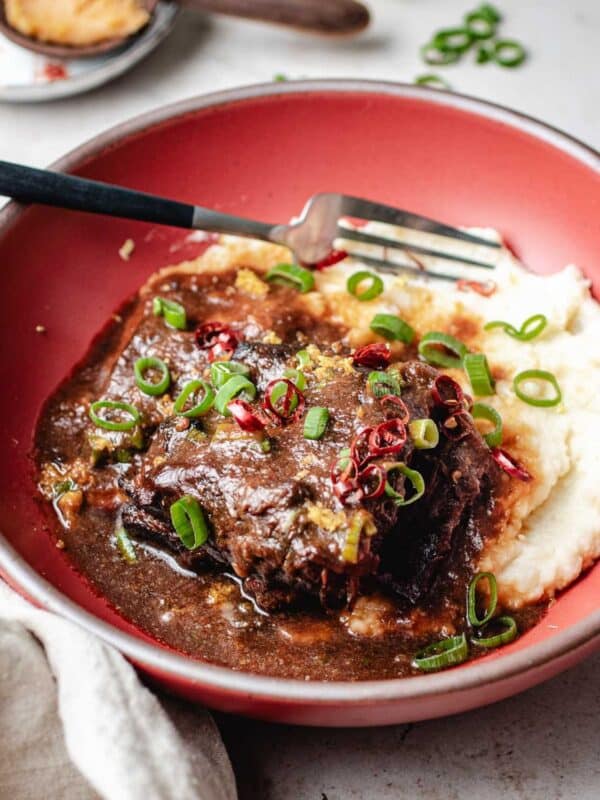
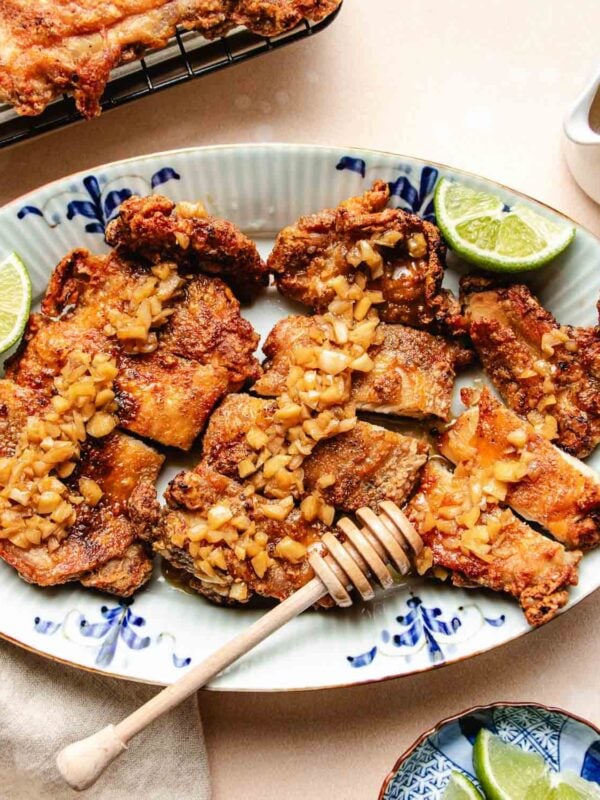
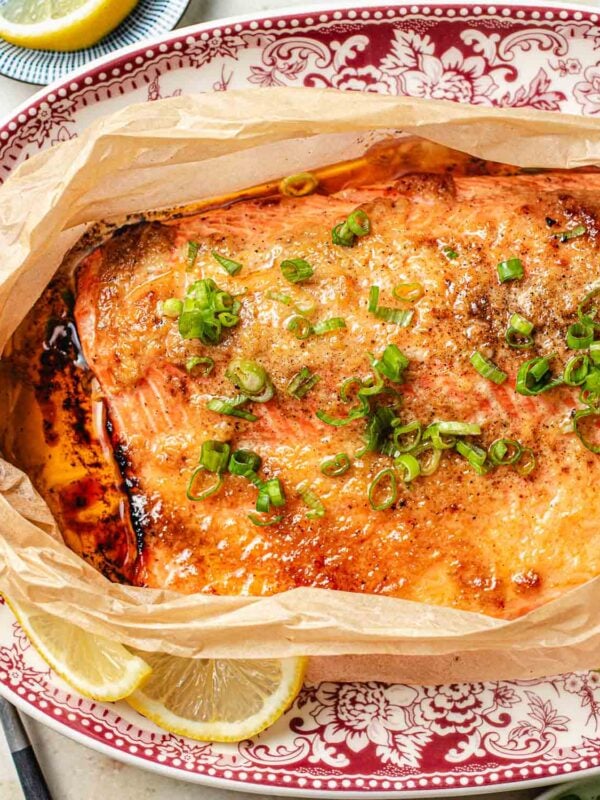
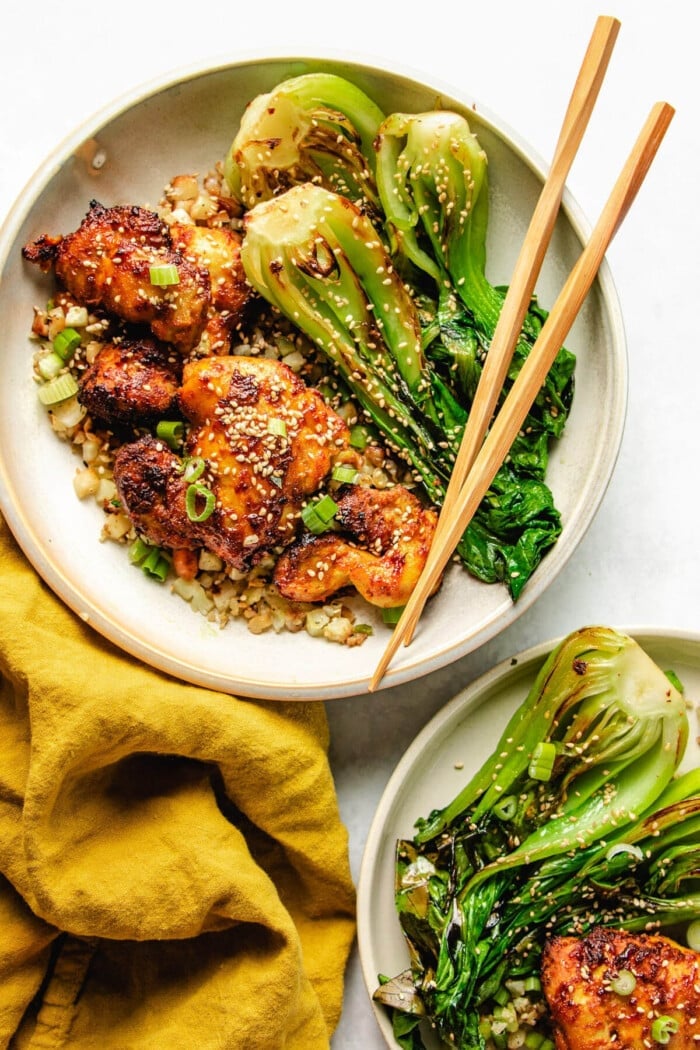








Love this recipe!! It’s one of my family’s favorites 🙂
Thank you so much, Sarah.
Absolute winner of a recipe. Thank you for this easy, comfy, cozy meal.
Lovely! Thank you, Lisa!
Thank you for these recipes! As an American newly living abroad in Okinawa, Japan, it is helpful to find paleo/healthy recipes using the new local ingredients available to me. Can’t wait to try this!
You are very welcome! We hope to visit Japan again, soon!
I’ve never reviewed a recipe before but this was so incredibly delicious, like shockingly good. The video is helpful and adorable too. Thank you!
Thank you so much, Amy. I appreciate you and so happy to hear you enjoyed the dish!
Easy & fabulous!!! Thank you! 🙂
Thank you. So happy to hear!